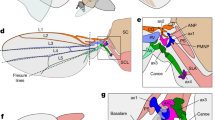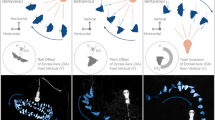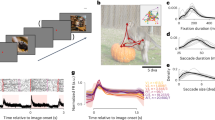Abstract
THE frequency sweep used by some bats is unlikely to be essential for distance perception by these animals, and is possibly no more than an accidental consequence of their method of sound production. When the cricothyroid muscles of the larynx of Eptesicus bats are denervated the modulation is altogether absent and the frequency becomes constant at about 10 kc. Yet such bats land normally on walls and avoid obstacles of moderate size. A slight decline in performance can be attributed to the greater wave-length used and the reduced vigour of the bats as a result of the surgical operation1.
This is a preview of subscription content, access via your institution
Access options
Subscribe to this journal
Receive 51 print issues and online access
$199.00 per year
only $3.90 per issue
Buy this article
- Purchase on Springer Link
- Instant access to full article PDF
Prices may be subject to local taxes which are calculated during checkout
Similar content being viewed by others
References
Griffin, D. R., Listening in the Dark (Yale Univ. Press, New Haven, 1958).
Novick, A., J. Exp. Zool., 138, 81 (1958).
Davis, H., Physiol. Rev., 37, 1 (1957).
Dijkgraaf, S., Experientia, 2, 438 (1946).
Author information
Authors and Affiliations
Rights and permissions
About this article
Cite this article
NORDMARK, J. Perception of Distance in Animal Echo-Location. Nature 190, 363–364 (1961). https://doi.org/10.1038/190363a0
Issue Date:
DOI: https://doi.org/10.1038/190363a0
Comments
By submitting a comment you agree to abide by our Terms and Community Guidelines. If you find something abusive or that does not comply with our terms or guidelines please flag it as inappropriate.



